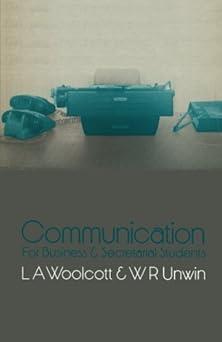Write a summary of the following passage in not more than 130 words. The hedges still make
Question:
Write a summary of the following passage in not more than 130 words.
The hedges still make a pretty pattern as you ride through England. To appease Productivity, the ugly new god with the ugly new name, they're being grubbed up and this arouses protest. Unreasonable protest really, because hedges are the relics of Enclosure, and so, symbolically at least, not pretty at all, but scars marking the expropriation of the peasants accomplished roughly (in both senses) between 1770 and 1830.
In 1833 six aggrieved Dorset labourers, George and James Loveless, John and Thomas Standfield, James Brine and James Hammett, formed a selfdefensive Friendly Society. On December 9 they held an initiation ceremony, with crude ritual and the swearing of an oath.
That oath was a miscalculation. Trades Unions were legal. Secret oathtaking wasn't. It gave Melbourne, Prime Minister and Home Secretary, indolent and able, the opportunity to dish out exemplary punishments.
Frampton, the local presiding magistrate, was also able - and not indolent.
The Tolpuddle men were transported.
Their seven-year sentences were harsh even by the whiplash standards of 1834. Objections lodged by idealists such as Robert Owen and battle-scarred rockers of the boat like Cobbett found support. In the summer of 1835 Lord John Russell, an establishment man willing to be sympathetic, moved to the Home Office. Free pardons were granted to all six. By 1838 five were back, to an official welcome, collections and publicity. George Loveless even wrote, or put his name to, a workmanlike pamphlet. Hammett - always the loner - didn't show up till 1839.
Mter the fuss, reaction. Many decades passed before the peasants could claim solid gains. Five of the Tolpuddle men left others to carry on freedomfighting and emigrated to Canada. But not Hammett. He died in Dorchester workhouse in 1891, and rarely did much talking. If you'd been sold like a sheep for a pound would you like to talk about it?
They are all ghosts now. Hardy could have written about them. He was close enough. But he preferred to write about Dick Dewy so· we shouldn't complain. Joyce Marlow provides as much information as we are ever likely to have. She loses grip on her prose sometimes, and it isn't necessary to tell us in summary what became of Lord John Russell, Frampton and so on.
Nevertheless her warm sympathies and eager storytelling carry the reader along.
386words David Williams, The Sunday Times
Step by Step Answer:

Communication For Business And Secretarial Students
ISBN: 9780333261750
1st Edition
Authors: Lysbeth A Woolcott, Wendy R Unwin






